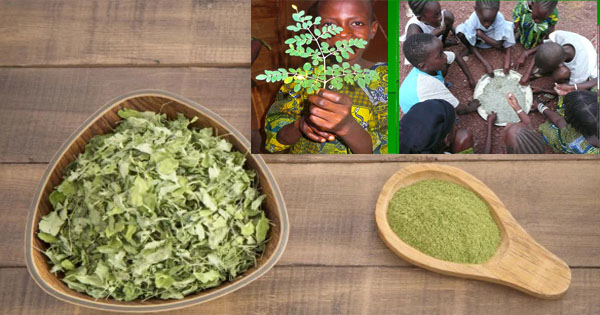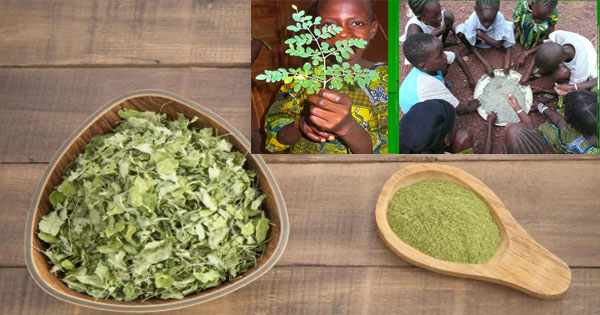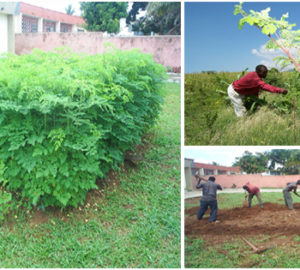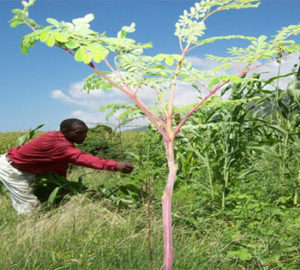
Moringa Oleifera: an alternative solution against malnutrition
Malnutrition is a real problem in some countries of the world. It is an imbalance between nutrient intakes and the needs of the body. In Africa, in Asia, it causes the death of millions of children.
Physically, malnutrition is manifested by:
The body weakens when nutritional intake is insufficient. The fat begins to disappear, and the muscles gradually melt. If the deficiencies increase, the person is in danger and risks his own life.
To remedy these problems and face the food crisis, the traditional plant Moringa Oleifera can be a solution to fight against malnutrition.
Study on the benefits of Moringa Oleifera against malnutrition
In 1998, over a period of eight months, 45 malnourished children were brought to an African clinic. Their age ranged from 0 to 5 years of age. Of these children, 20 were severely malnourished, and the rest were moderately malnourished.
Their moms received packets of Moringa Oleifera leaf powder. They added this plant to the diet of their children.
What was the result ?
Unfortunately, 3 extremely malnourished children did not survive. They failed to recover. These are the last 3 (from the photo). On the other hand, the other 43 survived. This is encouraging news.
Vénantie Wanbo, , a nutritionist explains:
” Moringa is a reality in many households today. It is a substitute for malnutrition and micronutrient deficiency. With its powder alone, you can recover the health of a child suffering from acute malnutrition in record time.. “
Clotilde Kasowa, a missionary nun responsible for the children’s home in Kintambo commune states:
” We take care of 27 orphans housed and fed here. They never suffer from anemia because they are regularly fed with leaves and Moringa powder that we add to cassava leaves, milk and tea.. “
Testimony on the benefits of Moringa
Marie Tsimba’s son had HIV, was in a state of acute malnutrition. She says that: “the friends advised her to put him under cure of Moringa for all his meals and 45 days after, the results were excellent my son is doing well.
“Jean Bolin Mbo,68 years old, had a cardiovascular accident. Jean Mbo says it’s the daily intake of Moringa that keeps him alive. He explains, “I have made a habit of eating since I discovered this plant, and I often consume it with tea, porridge, milk, or a sweet drink.”
The incredible story of Maïssatou & his daughter Awa
Maïssatou Diedhiou gave birth to her daughter Awa two months before the end of her pregnancy. The little Awa weighed only 1.5 kg. Mother Maissatou was extremely weak. She was dizzy and unable to produce enough milk for her baby.
he received powder “Nebeday” (it’s Moringa) from the Agada people. She added the powder to her food. And the results are surprising because dizziness has stopped, milk production has increased, and little Awa has begun to gain weight. Thanks to the miraculous nutrition of Moringa, Awa weighed 5 kg (as we see in this picture where she is 5 months old).
The story of Mariama Kamara
Mariama Kamara gave birth to a little boy who weighed 4 kg. At 9 weeks, the baby weighed 7kg 500g, because the Moringa was part of his diet.
All these stories come from the book “The miracle tree” edited by Lowell J. Fugile (1997).
| Powdered leaves in milk and with sugar | Fight against malnutrition while eating Moringa |
Another use for Moringa is to help increase milk production in breastfeeding mothers.
The nutritional value of Moringa Oleifera
Moringa Oleifera is a plant very rich in nutrients such as calcium, iron, potassium, minerals and proteins. But also, Moringa has the 10 animate acids essential to humans. Moringa is both beneficial for humans and animals.
Moringa leaves contain vitamins: A, B1, B2, B3, B5, B6, B8, B9, C. A consumption of 100g of fresh leaves provides about 50% of the daily requirements of calcium, protein, iron and a third of Potassium needs and essential amino acids for children from 1 to 3 years and 20 g of fresh leaves alone are sufficient for the daily needs of the child in vitamins A and C.
As can be seen in the drawing, above, the Moringa leaves contain:
• 4 * more calcium than in four glasses of milk
• 7 * more vitamin C than in seven oranges
• 3 * more potassium than in three bananas
• 2 * more protein than in two glasses of milk
• 4 * more vitamins A than in four carrots
• In powder form, the leaves are also rich in carbohydrates, fat, fiber, magnesium, protein and potassium.
• You can use leaves, buds and flowers, pods, seeds to enrich food: bread, milk, salad, sauces, pizza, pasta, etc.
What do you think?













